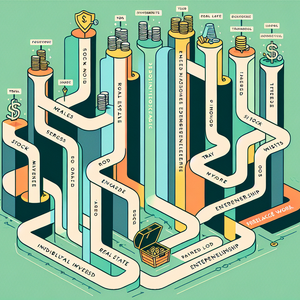The Gig Economy: A New Frontier for Employment

The gig economy has exploded in popularity over the last decade, with platforms like Uber, Lyft, TaskRabbit, and Upwork leading the charge. According to a report by the McKinsey Global Institute, as of 2020, up to 30% of the workforce in the United States was engaged in some form of gig work. This shift can be attributed to several factors, including technological innovation, the desire for work-life balance, and a changing mindset about employment. Gig jobs offer unparalleled flexibility, allowing individuals to set their own hours and choose their projects. This appeals particularly to diverse demographics, including students, parents, retirees, and even full-time employees seeking supplemental income. The rise of digital platforms has also made it easier for people to connect with potential employers, transforming the way work is sourced and completed.
Opportunities in the Gig Economy
The gig economy presents a plethora of opportunities for workers. For instance, ride-sharing and delivery services have created a whole new category of jobs that can be undertaken part-time or full-time, depending on an individual’s circumstances. Freelancers in fields like graphic design, writing, programming, and marketing can choose projects that align with their skills and interests, often earning competitive wages without the constraints of a traditional office environment. Moreover, the gig economy provides a unique chance for individuals to build a diverse portfolio of work. Freelancers can showcase a range of projects, which enhances their employability in the long run. A graphic designer, for example, may choose to work on projects that span different industries, from startups to established corporations, allowing them to develop a versatile skill set and attract a wider client base. Additionally, gig work can serve as a stepping stone for entrepreneurs looking to test their business ideas without the financial risk of launching a full-fledged company right away. For example, a freelance writer may explore various niches and develop expertise before deciding to write a book or start a content marketing agency.
Challenges and Considerations
Despite its advantages, gig work is not without challenges. One of the most significant issues facing gig workers is the lack of benefits typically associated with traditional employment, including health insurance, retirement plans, and paid leave. According to a report from the Economic Policy Institute, only 12% of gig workers have employer-sponsored health insurance, compared to 56% of wage and salary workers. This lack of security can lead to financial instability, particularly in times of economic downturn or personal emergencies. Furthermore, gig workers often face income variability, making financial planning difficult. While some may thrive in this environment, others may struggle with inconsistent pay. The absence of a guaranteed paycheck can create stress and uncertainty, which is why many gig workers are advocating for better protections and rights. The rise of worker advocacy groups indicates a growing awareness of these issues, with many calling for more robust labor protections and benefits tailored to the gig economy.
The Future of the Gig Economy
As we look to the future, the gig economy is poised to continue its growth trajectory. Emerging technologies like artificial intelligence and automation may further transform the types of gig jobs available, creating new opportunities while potentially displacing some traditional roles. For instance, as businesses increasingly rely on algorithms to source labor, understanding how to navigate these digital platforms will become essential for success in the gig economy. Moreover, as more people embrace gig work, there may be a push for policy changes to ensure fair treatment and benefits for gig workers. Cities and states are already beginning to explore legislation aimed at improving conditions for workers in this sector, which could lead to a more sustainable gig economy. Recent legislation in California, known as Assembly Bill 5, aimed to provide gig workers with more protections and benefits, setting a precedent that could influence similar laws nationwide.
The gig economy represents a revolutionary shift in the way we view work and employment. Offering flexibility, diverse opportunities, and the ability to craft one's own career path, gig jobs are increasingly appealing to a wide range of individuals. However, the challenges associated with gig work cannot be ignored, as issues like financial instability and lack of benefits pose significant hurdles for many workers. As the gig economy continues to evolve, it will be crucial for stakeholders—workers, employers, and policymakers—to find a balance that maximizes the benefits while addressing the inherent challenges. This new frontier for employment is not just a passing trend; it reflects broader changes in our society and economy, shaping the future of work in profound ways. As we navigate this transformation, it will be essential to ensure that the gig economy can provide a stable, equitable, and fulfilling work environment for all.
Freelance Graphic Designer
Startups, marketing agencies, small businesses
Core Responsibilities
Create visually appealing designs for various clients, including logos, brochures, and social media content.
Collaborate with clients to understand their vision and brand identity.
Manage multiple projects concurrently while meeting tight deadlines.
Required Skills
Proficiency in design software such as Adobe Creative Suite (Photoshop, Illustrator, InDesign).
Strong portfolio showcasing diverse design styles and projects.
Excellent communication skills to liaise with clients effectively.
Ride-Share Driver
Uber, Lyft
Core Responsibilities
Provide safe and reliable transportation to passengers using a personal vehicle.
Navigate efficiently to pick up and drop off clients while adhering to traffic laws.
Maintain a clean and well-maintained vehicle to enhance the passenger experience.
Required Skills
Strong knowledge of local geography and navigation tools.
Excellent customer service skills to ensure positive interactions with passengers.
Ability to manage time effectively to maximize earnings during peak hours.
Content Writer for Freelance Platforms
Content marketing agencies, online publications, small businesses
Core Responsibilities
Write engaging articles, blog posts, and marketing content for various clients across different industries.
Conduct thorough research to ensure accuracy and relevancy in content production.
Edit and proofread content to meet client specifications and enhance readability.
Required Skills
Exceptional writing and editing skills, with a strong command of grammar and style.
Familiarity with SEO best practices to optimize content for search engines.
Ability to adapt writing style to fit different brands and target audiences.
Virtual Assistant
Entrepreneurs, small businesses, busy professionals
Core Responsibilities
Provide administrative support to businesses or entrepreneurs remotely, including managing emails, scheduling appointments, and handling customer inquiries.
Organize and maintain digital files, ensuring easy access and efficient workflow.
Assist with social media management and basic marketing tasks.
Required Skills
Strong organizational skills and attention to detail.
Proficiency in software tools such as Microsoft Office and Google Workspace.
Excellent communication abilities, both verbal and written, to interact with clients and stakeholders effectively.
Freelance Software Developer (Web Development)
Tech startups, digital agencies, e-commerce companies
Core Responsibilities
Design, develop, and maintain websites and web applications for various clients.
Collaborate with designers and project managers to ensure technical feasibility and optimal user experience.
Troubleshoot and resolve software issues as they arise.
Required Skills
Proficiency in programming languages such as HTML, CSS, JavaScript, and familiarity with frameworks like React or Angular.
Experience with version control tools like Git and understanding of agile development methodologies.
Strong problem-solving skills to address technical challenges efficiently.


